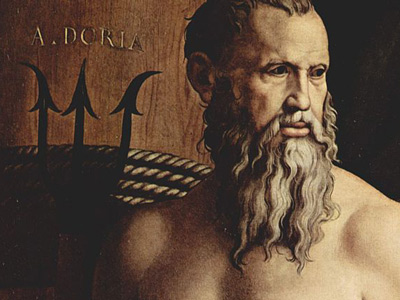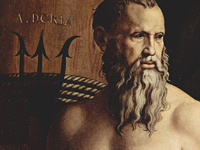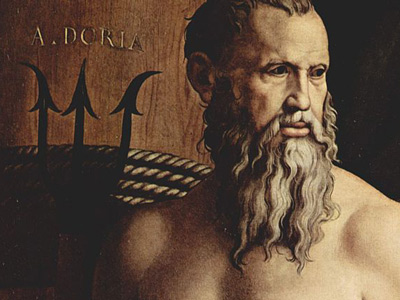Poseidon

Poseidon (/pəˈsaɪdən, pɒ-, poʊ-/; Greek: Ποσειδῶν, pronounced [pose͜edɔ́͜ɔn]) was one of the Twelve Olympians in ancient Greek religion and myth. He was god of the Sea and other waters; of earthquakes; and of horses. In pre-Olympian Bronze Age Greece, he was venerated as a chief deity at Pylos and Thebes.
Poseidon was protector of seafarers, and of many Hellenic cities and colonies. In Homer's Iliad, Poseidon supports the Greeks against the Trojans during the Trojan War. In the Odyssey, during the sea-voyage from Troy back home to Ithaca, the Greek hero Odysseus provokes Poseidon's fury by blinding his son the Cyclops Polyphemus, resulting in Poseidon punishing him with storms, the complete loss of his ship and companions, and a ten-year delay. Poseidon is also the subject of a Homeric hymn. In Plato's Timaeus and Critias, the island of Atlantis was Poseidon's domain. His Roman equivalent is Neptune.
Origins
It seems that the Arcadian myth is related with the first Greek speaking people who entered the region during the Bronze Age. (Linear B represents an archaic Greek dialect). Their religious beliefs were mixed with the beliefs of the indigenous population. It is possible that the Greeks did not bring with them other gods except Zeus, Eos, and the Dioskouroi. The horse (numina) was related with the liquid element, and with the underworld. Poseidon appears as a beast (horse), which is the river spirit of the underworld, as it usually happens in northern-European folklore, and not unusually in Greece. Poseidon “Wanax”, is the male companion (paredros) of the goddess of nature. In the relative Minoan myth, Pasiphaë is mating with the white bull, and she bears the hybrid creature Minotaur. The Bull was the old pre-Olympian Poseidon. The goddess of nature and her paredros survived in the Eleusinian cult, where the following words were uttered : " Mighty Potnia bore a strong son".
In the heavily sea-dependent Mycenaean culture, there is not sufficient evidence that Poseidon was connected with the sea. We do not know if "Posedeia" was a sea-goddess. Homer and Hesiod suggest that Poseidon became lord of the sea following the defeat of his father Kronos, when the world was divided by lot among his three sons; Zeus was given the sky, Hades the underworld, and Poseidon the sea, with the Earth and Mount Olympus belonging to all three. Given Poseidon's connection with horses as well as the sea, and the landlocked situation of the likely Indo-European homeland, Nobuo Komita has proposed that Poseidon was originally an aristocratic Indo-European horse-god who was then assimilated to Near Eastern aquatic deities when the basis of the Greek livelihood shifted from the land to the sea, or a god of fresh waters who was assigned a secondary role as god of the sea, where he overwhelmed the original Aegean sea deities such as Proteus and Nereus. Conversely, Walter Burkert suggests that the Hellene cult worship of Poseidon as a horse god may be connected to the introduction of the horse and war-chariot from Anatolia to Greece around 1600 BC.
It is almost sure that once Poseidon was worshiped as a horse, and this is evident by his cult in Peloponnesos. However he was originally a god of the waters, and therefore he became the "earth-shaker", because the Greeks believed that the cause of the earthquakes was the erosion of the rocks by the waters, by the rivers who they saw to disappear into the earth and then to burst out again. This is what the natural philosophers Thales, Anaximenes and Aristotle believed, which could not be different from the folklore belief. Later, when the Myceneans travelled along the sea, he was assigned a role as god of the sea.
In any case, the early importance of Poseidon can still be glimpsed in Homer's Odyssey, where Poseidon rather than Zeus is the major mover of events. In Homer Poseidon is the master of the sea.
LEGENDS

RESOURCES
This article uses material from the Wikipedia article "Poseidon", which is released under the Creative Commons Attribution-Share-Alike License 3.0.
© Stories Preschool. All Rights Reserved.









